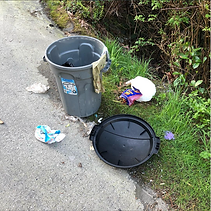Will green bins attract wildlife?
I have had a number of complaints directed at me already that green bins are going to be a huge problem regarding wildlife. I am writing this post to tell you that this is not the case for the following reasons:
1. Whether you put food waste in a garbage bin or in a green bin, the chance of wildlife being attracted to either is the same. It’s the smell that attracts them.
2. Green bins are more secure than your average trash bin, preventing smaller wildlife and birds from getting into the bin.
3. There is no such thing as a bear-proof bin, whether it’s a garbage bin or a green bin. I found that out the hard way.
4. If a bear does get into a green bin, at least it won’t be sending plastic and other garbage through its digestive system, and subsequently spreading it throughout our neighbourhood.
A typical garbage bin
Many wildlife interactions happen due to improper storage of garbage and food waste. I just finished building my hopefully bear deterring recycling station, and that is something I feel is everyone’s responsibility to reduce the chance of wildlife interaction.
The overall result should be a reduction in garbage-wildlife interaction, mostly from smaller mammals and birds. Keep in mind that the green bin is not the best way to deal with food waste, but is a compromise between convenience, effectiveness and cost. As a regional district we are trying to create the most benefit for the most people at the lowest cost. If you feel the green bin is not for you, you can pursue other courses, but they are expensive and at times labour intensive.
For example you can build an electrified, bear-resistant enclosure and then buy a $700 Jora composter to take care of your food waste needs. That leaves your bones and food soiled paper products, which you can put in the freezer until collection day, put them in your green bin and put them out then. That is what we do.
A Jora composter
Using regular ground based composters attracts a lot of rodents, especially close to the water, even if it is in a bear-resistant enclosure.
As for reducing the frequency of garbage pickup to bi-weekly - there will be some who create more garbage than that, be it from kitty litter, diapers or having a large household. The vast majority of households will be ok with bi-weekly. My three person household can make do with once a month pickup or even 6 weeks. My neighbour has 4 adults and 2 children contributing to one can, and they have critically looked at their garbage creation and have managed to reduce their garbage creation to work with bi-weekly service. This is a great incentive to look at your consumption and garbage creation patterns. There are cloth diapers, which we used with great success back in the day, for example. If you have done all you can and it's still not enough, you can purchase extra garbage tags for $2.50 at the SCRD.
Yes, green bins are not the ideal way to deal with food waste, but it is a lot better than having it continue to head to the landfill. We have to take the 40% food waste in our garbage out, compost it, and re-use it. It reduces our food waste related GHG emissions over 20 times and prolongs the life of our landfill. Organics pick-up services have been very popular in other communities. The 6 month pilot program in Davis Bay has been running for 5 years because residents love it and don’t want it stopped. I’m particularly pleased that we have contracted with a local company, Salish Soils, to process organics and produce soil that can be used here on the coast, where it's certainly needed. Give this program a chance and please let me know your thoughts.




